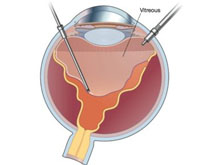
Vitrectomy is a surgical procedure that involves the removal or replacement of the vitreous gel from the eye. The vitreous is the clear gel-like substance that fills the space between the lens and the retina in the back of the eye. Vitrectomy is performed to treat various eye conditions, including retinal detachment, macular hole, diabetic retinopathy, and certain cases of vitreous hemorrhage. Here are key points about vitrectomy:
Surgical Indications:
- Retinal Detachment: Vitrectomy may be performed to repair a detached retina and reattach it to the underlying tissues.
- Macular Hole: It can be used to treat macular holes, which are defects in the central part of the retina.
- Diabetic Retinopathy: In advanced cases, vitrectomy may be done to remove blood or scar tissue causing traction on the retina.
- Vitreous Hemorrhage: It can be performed to address bleeding into the vitreous gel.
Surgical Procedure:
- Vitrectomy is typically performed under local or general anesthesia.
- Small incisions are made in the eye to insert microsurgical instruments, including a vitrectomy probe.
- The vitreous gel is either removed or replaced with a clear solution.
Retinal Detachment Repair:
- In cases of retinal detachment, vitrectomy may involve additional steps such as draining subretinal fluid and using laser or cryotherapy to create scars that help secure the retina in place.
Gas or Silicone Oil Tamponade:
- In certain cases, a temporary tamponade may be used to support the retina during healing.
- This can involve injecting a gas bubble or silicone oil into the vitreous cavity.
Recovery and Postoperative Care:
- Recovery time varies depending on the specific condition being treated.
- Patients are usually prescribed medications, and postoperative care includes avoiding strenuous activities and following the surgeon's instructions for positioning the head during the initial recovery period.
Potential Complications:
- Vitrectomy, like any surgery, carries risks, including infection, bleeding, and changes in intraocular pressure.
- Some individuals may experience changes in vision or other complications, and close follow-up with the surgeon is important.
Visual Rehabilitation:
- Visual recovery after vitrectomy depends on the underlying condition and the success of the surgical intervention.
- Visual rehabilitation, including any necessary refractive corrections, may be part of the postoperative care.
Vitrectomy is a specialized and delicate procedure performed by retinal surgeons to address complex retinal issues. The decision to undergo vitrectomy is based on a careful evaluation of the individual's eye health, the specific retinal condition, and the potential benefits and risks of the surgery. If you or someone you know is considering vitrectomy, it's important to consult with an experienced retinal surgeon for a thorough examination and personalized advice.